HME Business Award Winners
And the Winners Are...
A look at the winning entries for the first annual HME Business New Product Award competition.
- By David Kopf
- Dec 01, 2014
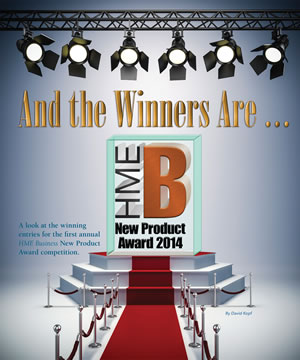 Home medical providers truly are an impressive lot. While they are wading through a morass of reimbursement and regulatory challenges, they are striving to improve their business practices, increase efficiencies, and fight to reinforce their margins. Moreover, aware that the Medicare business model is failing them, many providers are working overtime to determine how they can redirect their businesses to drive new revenues and build alternate business models. That’s a tall order to fill!
Home medical providers truly are an impressive lot. While they are wading through a morass of reimbursement and regulatory challenges, they are striving to improve their business practices, increase efficiencies, and fight to reinforce their margins. Moreover, aware that the Medicare business model is failing them, many providers are working overtime to determine how they can redirect their businesses to drive new revenues and build alternate business models. That’s a tall order to fill!
Except that’s only part of the workload. At the same time providers still must carry on serving patients. And that means they need to stay on top of the last DME offerings available to them. Providers must constantly be aware of new technologies and product innovations that can make a difference in their patients’ lives. Whether it’s a new therapeutic offering, or something that can help a patient lead a safer, more independent life, providers need to know what new DME is hitting the market. Their patients and referral partners have come to expect that level of product knowledge.
This is why HME Business decided to launch its first annual New Product Award competition this year. We wanted to create an award program that would recognize new products and services that either make a difference in patients’ lives, or that help providers run more efficient, stable and profitable businesses.
And, we’re even more excited to announce this year’s winners, who offered up exemplary offerings in their respective categories. There were eight winning products that were selected in the inaugural year of this program, and we were excited to confer the awards to the winning companies at this year’s Medtrade conference and expo, which was held Oct. 21 to 23 in Atlanta.
The winners are:
- Business Services — ARI Network Services for its Digital Marketing Services.
- Business Technology — Brightree for its Referral Services.
- Home Access — EZ-ACCESS for the Transitions Angled Entry Ramp.
- Mobility-Power Wheelchair — Quantum Rehab for the Pediatric Q6 Edge Power Chair with TRU-Balance.
- Mobility-Scooter — Pride Mobility Products Corp. for its Go-Go LX with CTS Suspension 4-wheel.
- Respiratory-In-Home Equipment — CAIRE Inc. for the SeQual eQuinox.
- Retail — Motivo for the Motivo Tour.
- Sleep-Resupply Items — Fisher & Paykel Healthcare for the F&P Simplus Full Face Mask.
It’s important to make it a point to not only recognize the winners, but also thank all the companies that submitted entries for this year’s award competition. While we can only have one winner per category, the entries that were submitted represented some of the best offerings in the industry. Needless to say, competition was tight and based on the scores our judges returned, the margin for victory was exceedingly narrow for many of the categories.
We’re also proud of how we handled the award judging. We wanted to make sure that this was a program that truly represented the providers’ interest. With that in mind, we decided that only HME providers should judge this contest. So, I want to extend a special thanks to our judges for participating in and supporting our new award program. They generously dedicated their time, expertise and careful consideration to all the entries. This year’s judges were:
- Steve Ackerman, president of Spectrum Medical.
- Georgie Blackburn, vice president of government relations and legislative affairs for BLACKBURN’S.
- John Eberhart, president of Eberhart Home Health Inc.
- John Letizia, president of Laurel Medical Supplies Inc.
- Justin Blanchard, Assured Medical Supply Inc.
Next year, we hope to expand the program even further with the addition of 11 more categories. That’ll mean more entries, more judges, and more help for providers needing to sort out the industry’s product offerings. Here are the categories we are hoping to add for 2015:
- Auto Access
- Bariatric
- Bath Safety
- Beds
- Diabetic Supply
- Mobility - Manual Wheelchair
- Seating and Positioning
- Respiratory - Portable Equipment
- Sleep - Therapy Systems
- Support Surface
- Wound Care
Now, without further ado, let’s dive in and tel you a bit about each winner:
Business Services
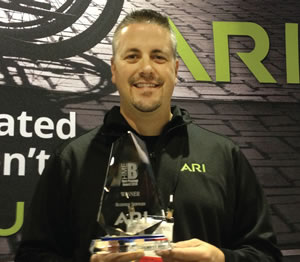
Helping providers leverage data-driven marketing solutions in order to help them “sell more stuff”: Dennis Olsen, sales manager for the Medical Industry group at ARI Network Services Inc.
As providers reach out to new payors and expand into retail sales, marketing to both referral partners and patients becomes critical. In that regard, ARI Network Services won for its suite of data-driven Digital Marketing Services that also involve hands-on support from the company’s team of digital marketing specialists.
Some key features of ARI’s marketing services:
- Website management services that include copy writing and graphics, as well as content management.
- Social media services that help providers better understand their audience , so that they can create an engaging strategy that delivers content to educate, entertain and ultimately drive more revenue.
- Email marketing services to enable providers to strategize, segment and execute email marketing campaigns ranging from newsletters to drip marketing campaigns.
- Search engine optimization expertise to help providers consistently publish content that
helps drive improved search engine rankings.
- Reporting tools and simplified performance metrics to help providers prove the ROI on their marketing efforts.
- Adwords services involving ARI’s Pay Per Click campaign managers, who conduct competitive analysis, keyword research and build keyword lists to craft PPC campaigns that connect providers with prospects.
Business Technology
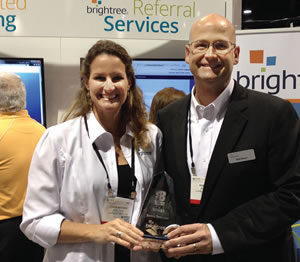
Using technology to connect providers with referral partners in new, strategic ways: Chris Watson, chief strategy officer, and Robert Boeye, executive vice president of sales, for Brightree LLC.
Much of the DME business is focused on making the right referral partner connections. Bearing that in mind, Brightree Referral Services is a solution that creates a simplified system for connecting HME providers (and other post-acute providers) with a large pool of referring healthcare professionals.
Brightree referral services is the result of a agreement between Brightree and athenahealth Inc., a major electronic health record (EHR) company for physicians. The joint offering combines a multi-endorsed in-network listing for participating post-acute care providers in the athenaCoordinator network of more than 18,000 healthcare providers, as well as a processing service by Brightree of referrals received from the providers in the athenaCoordinator network.
Brightree Referral Services integrates with athenaCoordinator’s cloud-based care coordination model to streamline the order process by simplifying the transmission and receipt of orders and enabling easy flow of order information into to the Brightree system. By clearly defining order requirements, physicians can improve order compliance for cleaner order processing while minimizing staff time spent on managing post-acute care orders. This lets providers reduce order entry time, while strengthening referral relationships and creating new revenue sources for increased sales.
Home Access
The Transitions Angled Entry Ramp from EZ-ACCESS
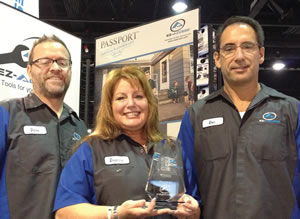
Helping patients surmount small home access obstacles that can feel ten-feet tall: Dave Henderson, senior marketing analyst, and Deanne Sandvold, vice president, along with Don Everard, CEO, of EZ-ACCESS (Left to Right).
Sometimes, even the smallest obstacles can get in the way of home access. That means that a slightly uneven threshold or slightly raised door (or lowered floor) can seem like an insurmountable challenge.
The Transitions Entry Ramps offer slip-resistant aluminum ramps that make it easier for patients to cross doorways and raised landings, and the ramps are designed for both indoor and outdoor use by patients.
In terms of dimensions, the Transitions lineup includes a freestanding aluminum Modular Entry Ramp system that works on thresholds ranging from 0.75 in. to 6 in. high, including sliding glass doors and raised landings. The aluminum Angled Entry Ramp, offers legs that individually adjust up to 2 in. in height, so that it can help smooth out uneven surfaces, such as decks and lawns. The ramp is made for single step rises and accommodates doors swinging both in and out. Moreover, providers can add a second ramp side-by-side to help patients access wider doorways.
Mobility-Power Wheelchair
The Pediatric Q6 Edge Power Chair with TRU-Balance from Quantum Rehab
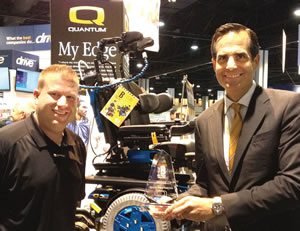
Working to create a whole new ballgame for pediatric rehab mobility: Jay Brislin, MSPT, vice president of Quantum Rehab, and Scott Meuser, chairman and CEO of Pride Mobility Products Corp. (Left to Right).
When Quantum designed the Pediatric Q6 Edge Power Chair it was trying to create a whole new ballgame in pediatric mobility. Features include seat sizes that measure as small as 12 in. wide by 12 in.; and overall back height as low as 14 in. high with tilt, and 19 in. high with tilt and recline. The seat-to-floor height is as low as 15.5 in. with tilt and recline and 18 in. with 10 in. tilt. In addition to accepting a complete range of seating and electronics options, the chair is designed with young, active users in mind. So, it is powered by 4-pole motors, and features Quantum’s Mid-Wheel 6 drive design to allow six wheels on the ground for maximum stability, and ATX Suspension, which incorporates front OMNICasters and semi-independent rear caster beam for enhanced performance over more varied terrain. Also, low-impact, nylon, spherical casters on the front and rear prevent wheel hang-ups. And, since it will attract young users, the shrouds come in a number of eye-popping colors and finishes to ensure the chair reflects and expresses their personality.
Mobility-Scooter
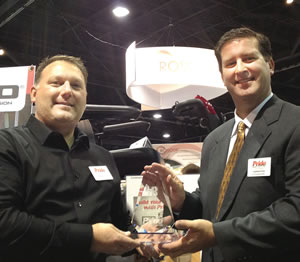
Retail mobility that still pumps up the features: Rick Michael, national retail sales manager, and Andrew Pyrih, senior vice president of domestic sales for Pride Mobility Products Corp. (Left to Right).
As more and more patients wind up buying their scooters on a retail basis, the onus is on providers to serve up not only cost-conscious models, but scooters that offer a range of enticing features. Pride’s Go-Go LX with Comfort-Trac Suspension (CTS) aims to offer a combination of performance, features and value to travel mobility. The CTS offers independent front and rear suspension for the device, which can carry up to 300 lbs. and travels at a top speed of 4.4. mph. Also, a front frame-mounted seat post offers additional stability.
For travel, the scooter offers feather-touch disassembly, along with an auto-connecting, front-to-rear cable, to permit simple frame separation with only one hand. A new frame design easily disassembles into five, lightweight pieces for convenient transport and storage. This modular design also makes the scooter easy to service.
A microprocessor-based controller offers optimal power management and added safety features, and an off-board dual voltage charger can charge the battery pack on-board or offboard. With racy paint to highlight the CTS components, two sets of changeable colored panels in Red and Blue, and Pride’s black, nonscuffing tires, the scooter is not short on looks, either.
Respiratory-In-Home Equipment
The SeQual equinox from CAIRE Inc.
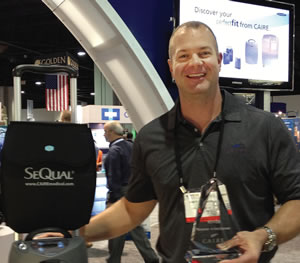
Easy-to-use portable oxygen therapy: Brett Townsend, director of sales and marketing CAIRE/SeQual parent company Chart Industries.
Portable oxygen concentrators are as much about their mobility and ease of use as they are their therapeutic benefit, and that’s not always an easy balance to strike. CAIRE’s SeQual eQuinox aims to offer lighter, quieter, and smarter oxygen therapy.
How smart? The Multi-Language Voice Interface offers a new layer of usability by providing verbal confirmation of changed flow rate settings, as well as announcing battery times and any alarms. The language can even be changed to offer feedback in the language most comfortable to the end user.
Weighing 14 pounds with a 12-cell battery pack installed, the eQuinox still manages to offer 3 LPM continuous flow. The POC can provide continuous flow options from 0.5LPM to 3.0LPM and 9 pulse flow settings from 16mL to 192mL, the eQuinox is a great fit for patients in varying disease continuums. The comprehensive dosing selection lets the use be treated at rest, during sleep, at exercise, and at altitude, and the autoSAT feature servo-control a patient’s FiO2 levels, providing even more assurance of proper dosing.
Retail
The Motivo Tour from Motivo
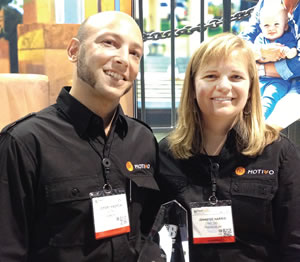
A brand new take that redefines a familiar HME offering: Motivo co-founders Jeremy Knopow and Jennifer Harris (Left to Right).
At first glance, the Motivo Tour is hard to figure out. The uniquely designed walker/rollator looks different from a lot of similar offerings, and that can initially throw the casual observer. However, on closer inspection, the eye-grabbing plastic shrouds that give the Motivo its unique style are hiding a lot of clever new takes on a familiar concept.
First off, the shrouds come in various colors, and Motivo offers additional graphic coverings to let users customize its looks anyway they please, from floral designs to team colors. The result is a walking aid that doesn’t look like old school “bent metal” but is still lightweight. Behind that shroud is a clever new take on the rollator: a rigid, padded seat is still there, but when not in use, it folds down to the side. This lets the user walk all the way in the device without having to walk further back in order to not have their knees bang into the seat.
The Motivo Tour also includes cup holders and storage to help users carry items with them, without having to hang bags hanging off the side, or remove storage accessories when the device is folded up for travel. That’s a retail offering that serves up a considerable level of value for the feature-minded customer.
Sleep-Resupply Items
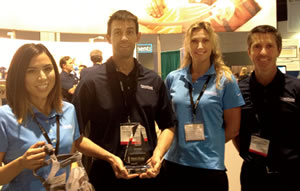
A dedicated focus on sleep therapy comfort and fit: Andrew Somervell (second from left), General Manager of OSA Business for Fisher & Paykel flanked by Simplus team members, as well as Justin Callahan, president of U.S. operations for Fisher & Paykel at right.
Sleep therapy compliance often comes down to one word: comfort. Bearing that in mind, Fisher & Paykel’s Simplus team sought to design a mask that is fully integrated into the patient’s lifestyle while emphasizing comfort as the primary objective, as well as seal and ease of use.
Balancing comfort with seal became a challenge because the mask needed to seal on a wide range of faces while still being comfortable. Also a key comfort area the team identified focused around the bridge of the nose. To strike that balance of comfort and seal, The Simplus leverages three key components: the headgear, frame and seal.
The Simplus headgear is designed to provide both stability and comfort, with rounded edges and multiple densities in specific zones to assist the user when fitting. The headgear ergonomically sits on the users head, avoiding painful areas like the lower neck and ears. It has embedded Velcro tabs allowing the user to easily adjust the tension to suit their individual comfort and includes easy clips for quick fitting on and off.
The Simplus seal incorporates a new technology that takes the pressure of the user’s bridge of nose by rolling in and out to conform to a wide variety of nose bridge shapes and sizes. Its soft texture and variable thickness silicone provides comfort and performance in a close and personal environment.
Also, the Simplus’s minimal design characteristics and organic flowing lines help the mask feel less obtrusive, which helps the user to focus more on their therapy and not worry about their mask, and the surface finishes provide clarity and a sense of cleanliness but are also soft and inviting.
This article originally appeared in the December 2014 issue of HME Business.